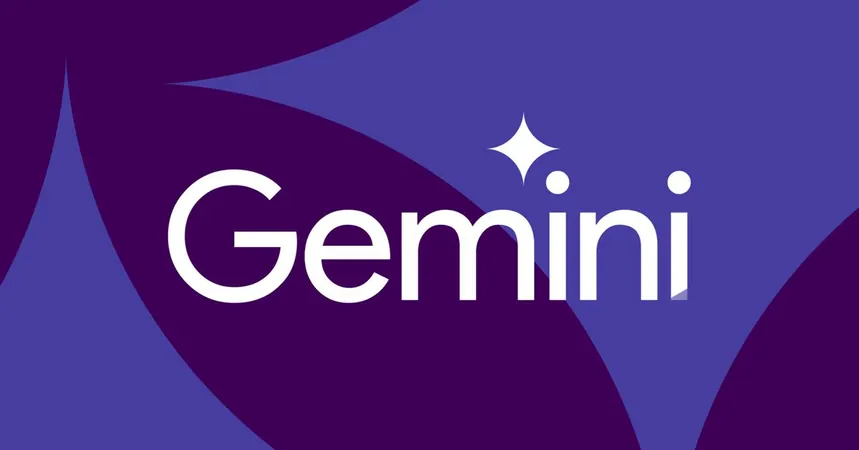
Google’s Gemini Shaping the Future of AI Assistants—Are Other Brands Falling Behind?
2025-01-22
Author: Yan
Introduction
In a groundbreaking shift for Samsung smartphone users, Samsung's latest devices now allow users to access Google's Gemini when long-pressing the side button, a departure from Bixby, Samsung's previous virtual assistant. While Bixby has evolved over the years to perform standard virtual assistant tasks, it never quite matched the intelligence and capabilities of competitors like Alexa, Google Assistant, and Siri. If you've relied on Bixby in the past, rest assured, you can still access it through an app. However, Google's Gemini could be a game-changer for your smartphone experience.
The Emergence of Google’s Gemini
Gemini's integration into Samsung phones is just the beginning of a much larger narrative for Google. Following the unexpected launch of ChatGPT in late 2022, Google has swiftly adapted and incorporated cutting-edge AI capabilities, with CEO Sundar Pichai now asserting that Gemini has outpaced ChatGPT. Google's ambitious goal is to register 500 million users by the end of this year, significantly aided by Samsung's extensive smartphone market reach.
User Engagement and Data Collection
With Gemini now a prominent feature on the world's most popular Android devices, millions of users are expected to engage with it regularly. This influx will not only drive user interactions but also improve Gemini's performance through the collection of user data. The loop of user engagement creating more data, which in turn enhances Gemini's capabilities, positions Google uniquely in the assistant race.
Competition Landscape
Currently, Gemini stands out as the leading virtual assistant available, largely due to its extensive access to information and an expansive user base. The competition is fierce but undeniably skewed in Google’s favor. While existing AI products are still refining their capabilities, Google’s ubiquity across devices accelerates the learning curve for Gemini, potentially cementing its dominance much as it did with search engines in years past—though this came with legal challenges for anti-competitive practices.
Challenges for Rivals
For quite some time, the landscape of AI assistants has been primarily defined by three heavyweights: Amazon's Alexa, Google Assistant, and Apple’s Siri. However, this title race faces significant challenges. For instance, Amazon's ambitious “Remarkable Alexa” project has encountered notable delays, while Siri’s new upgrades have largely focused on cosmetic changes rather than improvements in functionality.
Distribution Advantage of Gemini
Although rivals such as ChatGPT, Claude, Grok, and Copilot show promise with strong models, they lack the pivotal element of distribution that gives Gemini a crucial edge. Unlike these apps, which require separate installation and engagement, Gemini can be accessed with the simple press of a button, making it far more user-friendly.
Integration into Google Ecosystem
Moreover, Gemini's deep integration into both Android and Google services sets it apart. With features like the ability to manage phone settings and interact with multiple apps seamlessly, Gemini stands as a formidable competitor as digital assistants continue to evolve. Google’s ability to embed Gemini across various platforms, including Gmail and Google Docs, enhances its availability. As of now, Gemini is utilized in all seven of Google's products that boast over two billion monthly users.
Challenges Ahead
Smartphones remain the primary device for AI interaction, and Google is capitalizing on this fact. By ensuring that Gemini enhances the Android experience, Google is making strides that its competitors, particularly Apple, find difficult to match. The challenges for Apple’s Siri are made evident as they grapple with integrating ChatGPT to expand functionalities.
Conclusion
Despite its advancements, Gemini—and indeed, all virtual assistants—still faces hurdles. They misinterpret tasks or provide incorrect information, leading to frustrations among users. However, as we delve deeper into an AI-driven future, establishing a strong foothold for an AI platform among users is critical. The more we integrate these tools into our lives, the more challenging it will be to switch to alternatives.
While ChatGPT initially captured public attention through its engaging chatbot format, Google's distribution strategy ultimately allows Gemini to reach out to a vast audience daily, across an array of products. This not only enables Google to gather crucial feedback but also positions it advantageously in the AI space, making its capabilities increasingly sophisticated. As the battle for AI supremacy unfolds, Google seems well-positioned to emerge as the dominant force. The time has come to ask: will it become the unrivaled champion of virtual assistants, or could other contenders rise to the occasion? Stay tuned!



 Brasil (PT)
Brasil (PT)
 Canada (EN)
Canada (EN)
 Chile (ES)
Chile (ES)
 Česko (CS)
Česko (CS)
 대한민국 (KO)
대한민국 (KO)
 España (ES)
España (ES)
 France (FR)
France (FR)
 Hong Kong (EN)
Hong Kong (EN)
 Italia (IT)
Italia (IT)
 日本 (JA)
日本 (JA)
 Magyarország (HU)
Magyarország (HU)
 Norge (NO)
Norge (NO)
 Polska (PL)
Polska (PL)
 Schweiz (DE)
Schweiz (DE)
 Singapore (EN)
Singapore (EN)
 Sverige (SV)
Sverige (SV)
 Suomi (FI)
Suomi (FI)
 Türkiye (TR)
Türkiye (TR)
 الإمارات العربية المتحدة (AR)
الإمارات العربية المتحدة (AR)